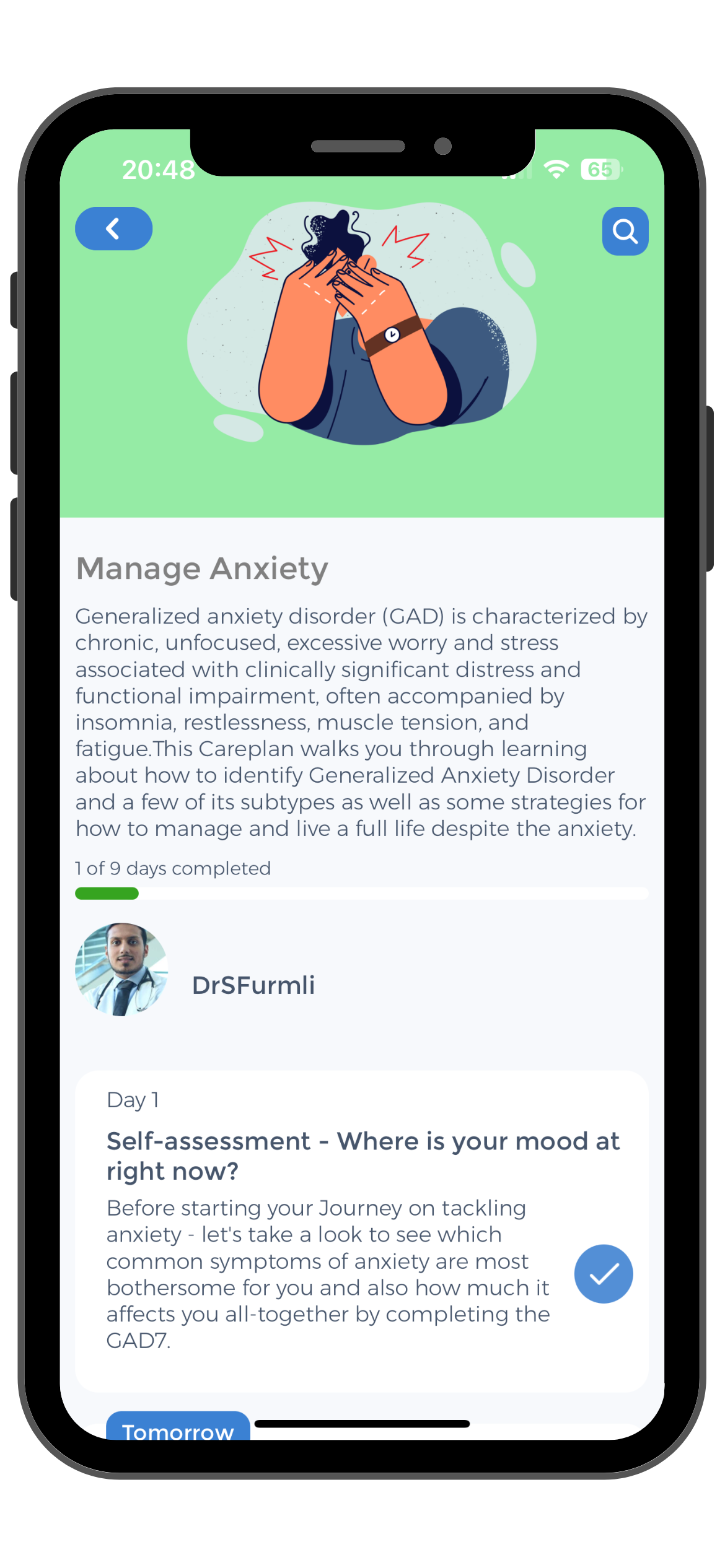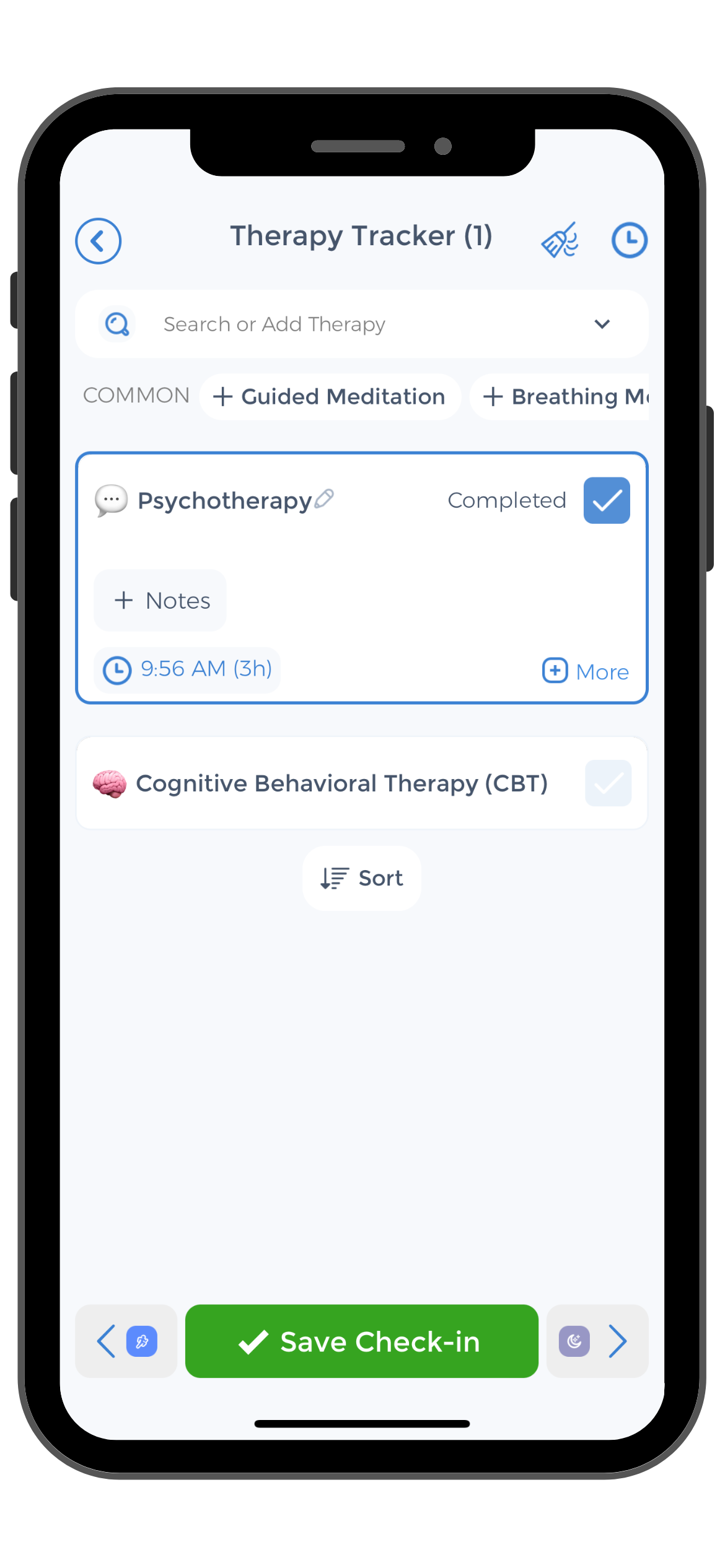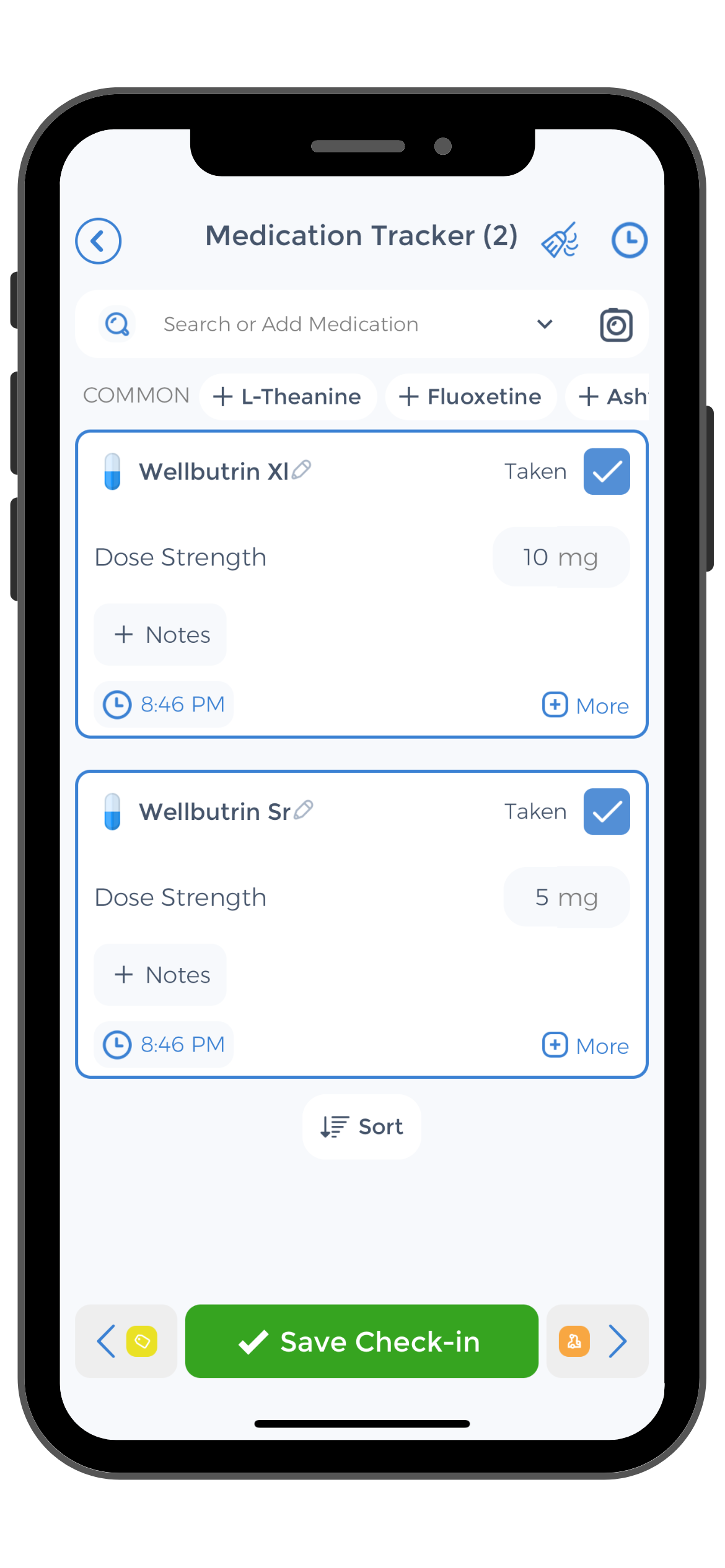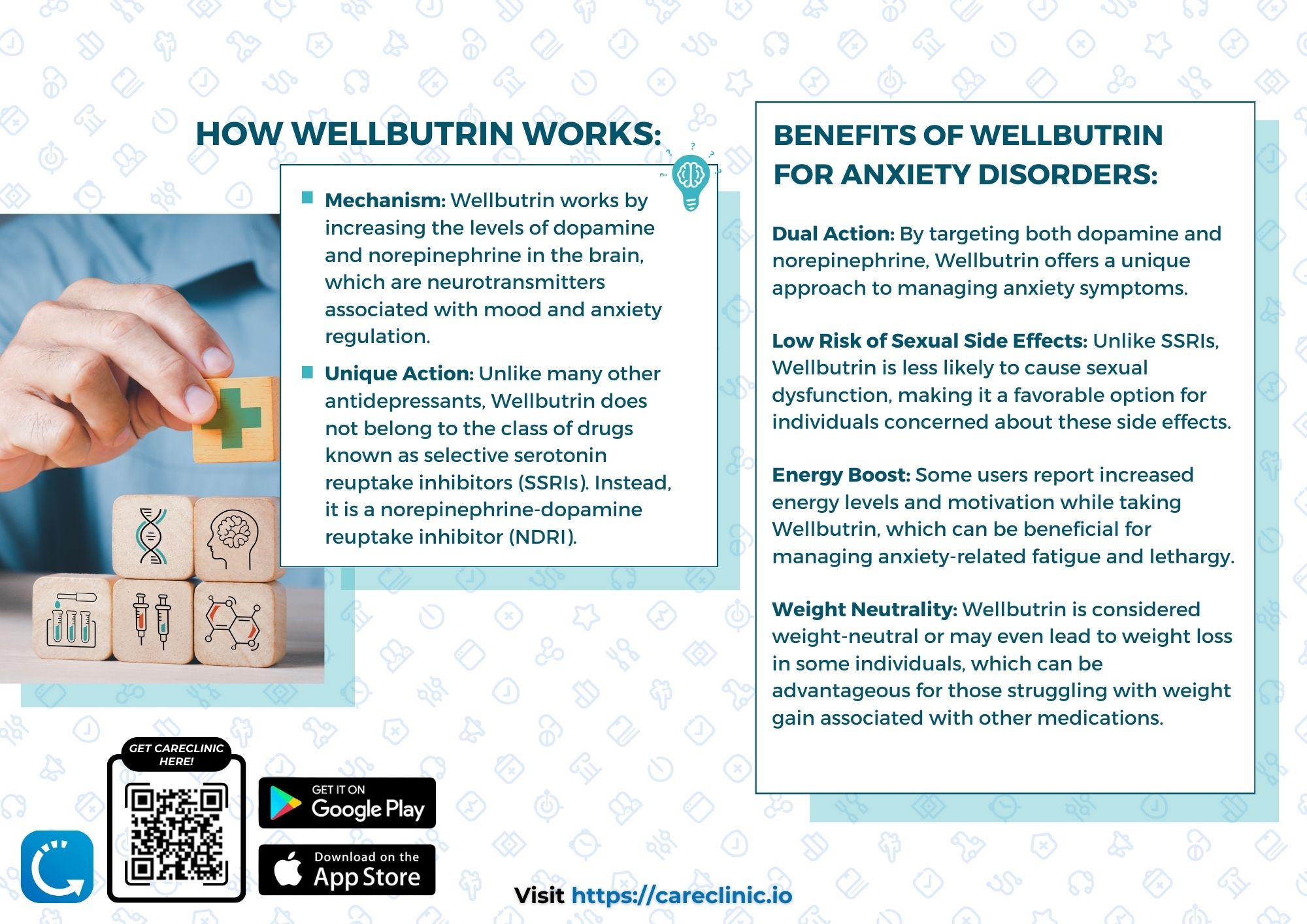
Even though anxiety disorders are among the most prevalent mental disorders in adults, anxiety was relatively poorly understood up until two decades ago1. Approximately 31.1% of adults suffer from an anxiety disorder at any point in their lives1. This includes but is not limited to, generalized anxiety, social anxiety, and phobias1.
Imagine experiencing consistent trouble sleeping, headaches, muscle tension, and constant worry2. None of it seems to be working with therapy, home remedies, general anxiety medications, and healthy coping strategies. Day after day, you find yourself seizing up from your persistent worrying. This state of helplessness can be quite tolling on your well-being.
If no treatments appear to be working, your healthcare provider might recommend straying from the typical and instead testing out the atypical. This could include newer forms of therapy or drugs advertised for related disorders, but not the anxiety itself. Bupropion, more commonly known by the brand name Wellbutrin, is an antidepressant marketed for mood disorders3. However, this medication is also used to treat smoking cessation and ADHD and has interestingly shown promising effects in treating anxiety3.
What is an Anxiety Disorder?
 An anxiety disorder is most easily distinguished by persistent and uncontrollable worry occurring for at least six months2. It is a chronic disorder in most scenarios but is generally manageable through first-line treatments such as cognitive behavioral therapy and pharmacotherapy (medication). It is important to remember that anxiety is a general term for many subtypes of the disorder, making a person’s experience with anxiety quite unique. Anxiety is also highly associated with other mental disorders, including depression, alcohol, and substance abuse, and physical health problems1,2.
An anxiety disorder is most easily distinguished by persistent and uncontrollable worry occurring for at least six months2. It is a chronic disorder in most scenarios but is generally manageable through first-line treatments such as cognitive behavioral therapy and pharmacotherapy (medication). It is important to remember that anxiety is a general term for many subtypes of the disorder, making a person’s experience with anxiety quite unique. Anxiety is also highly associated with other mental disorders, including depression, alcohol, and substance abuse, and physical health problems1,2.
Anxiety disorders can manifest in various forms, including generalized anxiety disorder (GAD), panic disorder, social anxiety disorder, and specific phobias, each with its own distinct features and challenges. The impact of anxiety can extend beyond mental health, significantly affecting a person’s daily life and overall well-being. For instance, chronic anxiety can lead to difficulties in maintaining relationships, performing well at work or school, and engaging in social activities. Additionally, the physical symptoms of anxiety, such as increased heart rate, muscle tension, and gastrointestinal issues, can further complicate the individual’s condition. Early intervention and a tailored treatment approach are crucial in helping individuals manage their symptoms and improve their quality of life.
Anxiety Symptoms
Some additionally defining characteristics of anxiety include:
- Excessive and uncontrollable worry or restlessness1,4
- Hypervigilance1,4
- Inexplicable feelings of doom1,4
- Irritability1,4
- Fatigue/Insomnia1,4
- Difficulty concentrating1,4
- Headaches, muscle aches, stomach aches or pains1,2,4
3 Types of Anxiety Disorder
Panic Disorders
Frequent and unexpected panic attacks regularly occur for individuals suffering from panic disorder4. A panic attack is a general term for a sudden period of intense fear, loss of control and anxiety with or without a clear trigger. Although panic attacks are necessary to be diagnosed with panic disorder, not everyone who has experienced a panic attack has the disorder. Symptoms of panic disorder include trembling, chest pain, tingling and trouble breathing4.
Social Anxiety Disorder
Social anxiety disorder refers to intense and consistent fear of being watched and judged by others4. In most scenarios, this fear of social situations can be so intense that it may feel beyond their control. This can cause server disruptions to daily activities such as going to work, school or even taking a trip to the grocery store. Some distinguishing social anxiety symptoms include blushing, a racing heart, difficulty making eye contact and a rigid body posture4.
Phobia-Related Disorders
A phobia is essentially an intense fear or aversion to a specific entity or situation4. A certain level of anxiety toward a scary or worrisome circumstance is normal. However, a person with a phobia will likely react unreasonably out of proportion. Characteristic symptoms of a phobia include irrational and excessive worry over encountering the object of their fear, intense and immediate anxiety upon encountering their feared object/situation and taking active avoidance steps4.
Common treatments
Treating anxiety is not a matter of self-discipline or attitude5. Often they are caused by chemical imbalances, environmental factors and hereditary predispositions that cannot be simply willed away. Over the more recent year, researchers have made significant progress in developing treatment plans combining psychotherapy and medication to best target anxiety symptoms 5.
Psychotherapy for Anxiety
 Psychotherapy primarily targets your emotional response to your disorder5. Subsequently, therapy or counseling aims to guide you in better understanding and managing your disorder using specific strategies and mechanisms. There are multiple approaches to therapy, one of the most prevalent and recent being cognitive behavioral therapy, or CBT. CBT teaches you how to recognize and acknowledge certain individual thoughts and behavioral patterns that lead to your anxiety.
Psychotherapy primarily targets your emotional response to your disorder5. Subsequently, therapy or counseling aims to guide you in better understanding and managing your disorder using specific strategies and mechanisms. There are multiple approaches to therapy, one of the most prevalent and recent being cognitive behavioral therapy, or CBT. CBT teaches you how to recognize and acknowledge certain individual thoughts and behavioral patterns that lead to your anxiety.
Once you know what to look for, it becomes easier to change these patterns! Exposure therapy is likely the most effective way to overcome phobia disorders this type of therapy teaches you how to engage and work through situations you fear. Additionally, relaxation techniques and imagery also play large parts in exposure therapy5. You can create an ADHD workbook or an anxiety workbook to log your progress with psychotherapy.
Dosage for Anxiety
While prescribed medications cannot cure anxiety disorders, they can help greatly manage your anxiety symptoms 5. Often, you will feel much more functional and able to tackle your day after starting a drug-based regimen for your disorder. Typical anti-anxiety medication, taking benzodiazepines, for example, can work to decrease your panic and worry. While these drugs work quickly, they lose efficiency over time as you begin to build a tolerance to them.
In these scenarios, your doctor may only prescribe anti-anxiety medication in the short term before introducing a new medication. This could include beta-blockers or antidepressants. Moreover, antidepressants can improve your mood and reduce stress. However, it is important to note that they need time to take effect5.
Diagnosing and treating anxiety can be a lengthy and tiring process. Mentally flipping through your most recent anxiety symptoms and trying to identify triggers, strategies, and medications that work for you is no easy task. CareClinic offers anxiety symptoms, therapy and medication trackers that allow you to securely keep all of your pertinent treatment information in one place. Additionally, adding a Care Plan specifically for your anxiety can help keep your information separate and easily accessible. CareClinic works to make your health easier to maintain. By tracking your anxiety-related information, you and your physician can waste no time staying ahead of your disorder!
Wellbutrin for Anxiety Disorders
Wellbutrin, or bupropion, treats depression and seasonal affective disorder3. However, it has become a favourite among psychiatrists in treating anxiety6. Wellbutrin is an NDRI – a norepinephrine and domine reuptake inhibitor – that does exactly what its name states3.
Wellbutrin effectively blocks the body’s reuptake of these two neurotransmitters, keeping them available for longer periods. Both norepinephrine and dopamine are happy neurotransmitters, promoting feelings of happiness, excitement, energy, motivation, and mood. The longer they are present, the more likely they will be transmitted from neuron to neuron in your brain and increase your overall mood. Importantly, Wellbutrin is not the only brand name for bupropion; Aplenzin and Forfivo are other common brand names for the drug3.
Wellbutrin Dosage to Treat Depression and Treat Major Depressive Disorder
While the dosage prescribed to you is determined by your doctor and can change over time, the tablets are generally sold and produced at a strength of 75 mg7. Moreover, the starting Wellbutrin dosage for treating depression is usually 150 mg to 225 mg daily, while the starting dosage for anxiety is less.
It is important to recognize that the Wellbutrin dosage for depression and the dosage for anxiety vary and will likely change throughout your treatment until you and your doctor find a dosage that works best for you. The Wellbutrin dosage for depression is generally larger, while the dosage for anxiety is smaller7.
Bupropion Side Effects
Wellbutrin is often praised as a drug without the common side effects of sexual dysfunction and weight gain3,7. Contrastingly, many use Wellbutrin for anxiety and weight loss as a side effect. However, in addition to these two symptoms, the drug does come with its list of side effects to consider when beginning this line of treatment. Bupropion side effects include:
- For example, headaches3,7
- Weight loss3,7
- Dry mouth3,7
- Insomnia3,7
- Nausea/Dizziness3,7
- Constipation3,7
- Rapid heart rhythm3,7
- Sore throat3,7
In only about 10% of cases, more serious bupropion side effects can occur, including:
- For example skin rash3,7
- Sweating3,7
- Ear ringing3,7
- Trembling3,7
- Stomach/Muscle pain3,7
- Disturbance to thought patterns3,7
- And Eye pain/swelling/redness3,7
How Does Wellbutrin Work for Anxiety?
Despite the biochemical effects of bupropion best fitting to treat depression, recent research suggests the drug works just as well to treat anxiety3. Clinical studies have shown that using bupropion for anxiety scores similar in efficacy and tolerance to other common anxiety medications, such as sertraline and escitalopram.
Thus, bupropion appears to be a well-tolerated anxiety-reducing treatment option. Moreover, Wellbutrin is an anti-depressant at its core, making the drug especially appropriate as a treatment for comorbid depression-related anxiety. Related studies prove this effect by producing lower anxiety scores in patients with clinical depression3.
Does Wellbutrin cause Anxiety?
As bupropion is classified as a type of antidepressant, there seems to be a consensus that using the drug will exacerbate anxiety compared to relieving it. This is a common misconception that appears often as antidepressants are known to cause anxiety as a side effect of their usage.
So, does Wellbutrin cause anxiety? The short answer is yes, but the reality is much more complicated than a one-word answer. As with taking any antidepressant medication, the side effects of Wellbutrin do pose a risk that the patient is made aware of. One of these side effects is, in fact, anxiety, but it is essential to understand that Wellbutrin does not pose a greater risk for anxiety in comparison to any other antidepressant3. Only about 10% of depressed patients report experiencing this side effect. This small risk, though present, should largely be considered by the majority of people who enjoy a reduction in their anxiety levels while taking Wellbutrin3.
Consider using a medication tracker to determine if Wellbutrin is a good fit for you. Medication trackers can help you record your dosage, side effects and efficacy over some time. Additionally, the CareClinic medication tracker offers a correlation graphing option for you to visualize the impact of bupropion dosage on your anxiety symptoms. Using CareClinic will help you find your custom-tailored plan to treat anxiety easier!
How Long Does it take for Wellbutrin to Work?
As with most antidepressant medication, anxiety symptoms after 6-8 weeks determine the effect the drug is taking8. This allows your physician to get a good handle on how the drug interferes with your emotions. Furthermore, while you might see improvement after only two weeks of the drug, it is only at the six weeks mark that effects on mood are truly seen8. However, it is always a help to remember that each person is different – there are no hard and fast rules. Some may experience their pharmacotherapy treatments sooner, while others may take longer. Make sure to consider your history with other medications and discuss it with your doctor to get your personal best estimation.
Wellbutrin XL vs. Wellbutrin SR
 While it can take weeks to observe signs that Wellbutrin is working for anxiety, the drug takes hours to release into your system. There are currently two main formulations of bupropion: sustained-release (SR) and extended-release (XL) versions8,9. The original formulation of Wellbutrin required thrice daily administration, making it a timely and inconvenient design8.
While it can take weeks to observe signs that Wellbutrin is working for anxiety, the drug takes hours to release into your system. There are currently two main formulations of bupropion: sustained-release (SR) and extended-release (XL) versions8,9. The original formulation of Wellbutrin required thrice daily administration, making it a timely and inconvenient design8.
Wellbutrin SR is the faster version of the medication, absorbing faster than bupropion XL. It takes approximately 3 hours for the amount of bupropion to peak and steady in your blood8,9. Additionally, Wellbutrin SR releases medication for up to 12 hours, calling for a second dosage at the end of the first period8,9.
Contrastingly, Wellbutrin XL is released more slowly into your body8,9. This causes the medication to remain in your system for longer, spiking only around the 5-hour mark. Moreover, the amount of Wellbutrin XL in your system does remain relatively steady through the 24-hour cycle, eliminating sudden increases or decreases. Consequently, this steady release of Wellbutrin XL can potentially help reduce side effects and only requires a single dose8,9.
What to Pair with Wellbutrin for Anxiety?
Lexapro and Wellbutrin for Anxiety
As you continue to treat anxiety, you may find that a combination of medications works best for you. One combination with potential is Lexapro and Wellbutrin for anxiety. Specifically, a 2009 study shows a promising increase in response rate when combining escitalopram and bupropion at 20 mg and 400 mg per day, respectively10. Almost 62% of the 51 patients showed significantly higher results, with decreased depression and anxiety levels by the end of the 8-week study10.
Similarly, many studies have solidified the benefits of combing bupropion with a selective serotonin reuptake inhibitor (SSRI), like Lexapro11. Moreover, using Lexapro and Wellbutrin for anxiety is generally well-tolerated, boosts anti-anxiety responses and reduces SSRI-associated side effects such as weight gain and sexual effects11. As always, this treatment should be thoroughly discussed with your physician before deciding if it is a good fit. All possible side effects and drug interactions must be considered.
Exercise
You’ve heard it repeatedly: exercise is great for your overall well-being. Well, that’s because it is true! Exercise has physical benefits but can also significantly improve your mood and anxiety levels3. Relevant research shows the impressive effect of exercise in decreasing depression and anxiety. Regular exercisers tend to experience fewer anxiety symptoms than those who do not put as much emphasis on their activity level3.
Meditation
Meditation is another great addition to treat anxiety and is easy, convenient, and medication-free3. Just 10 minutes of meditation and active mindfulness for the comfort of your home reduces stress and anxiety scores, improving your mental wellbeing3!
Withdrawal Symptoms
Withdrawal symptoms of Wellbutrin can include anxiety, irritability, and difficulty sleeping. These anxiety symptoms are usually mild and go away within a few days. However, if you experience severe or persistent withdrawal symptoms, you should contact your doctor. Wellbutrin is not addictive, so you will not experience withdrawal symptoms if you stop taking the medication suddenly.
How to Monitor Wellbutrin to Treat Anxiety
CareClinic offers a unique variety of trackers, visualization options, analysis, and features that you can customize to best record your experience treating anxiety with Wellbutrin. The symptom tracker helps you recognize that Wellbutrin is working and is good for your anxiety. The diary feature sets apart the CareClinic app by giving you a blank slate to log other habits you might try. This can help you determine what to pair with Wellbutrin for your anxiety.
Additionally, correlation charts and reports are great, easy-to-understand sources of information for your physician to consider when beginning your anxiety journey. When dealing with more specific types of anxiety, you might consider using the factors feature to track your social contact and determine the efficiency of Wellbutrin for your social anxiety.
The takeaway: CareClinic has several features you can try to help get a hold of your anxiety and bipolar disorder. Overall, it is a great starting point or addition to your health journey and aims to help you feel your best! Take control of your health and stay one step ahead of your anxiety with the CareClinic app today! Install the app here.
References
- Wittchen, H-U., & Hoyer, J. (2001). Generalized Anxiety Disorder: Nature and Course. Journal of Clinical Psychiatry, 62(11), 15-19. https://www.psychiatrist.com/read-pdf/7719/
- Stein, M. B., & Sareen, J. (2015). Generalized Anxiety Disorder. The New England Journal of Medicine, 373, 2059-2068. https://doi.org/10.1056/NEJMcp1502514
- Estevez, C. (2022, June 1). When To Take Wellbutrin For Anxiety. Retrieved from: https://healthmatch.io/anxiety/wellbutrin-for-anxiety
- National Institute of Mental Health. (2022). Anxiety Disorders. Health Topics. Retrieved from: https://www.nimh.nih.gov/health/topics/anxiety-disorders
- Cleveland Clinic. (2020, December 17). Anxiety Disorders. Retrieved from: https://my.clevelandclinic.org/health/diseases/9536-anxiety-disorders
- Cascade, E. F., Kalali, A. H., & Thase, M. E. (2007). Use of Antidepressants. Psychiatry, 4(12), 25-28. https://www.ncbi.nlm.nih.gov/pmc/articles/PMC2861511/
- WebMD. (n.d.). Wellbutrin 75 Mg Tablet – Uses, Side Effects, and More. Drugs & Medications. Retrieved from: https://www.webmd.com/drugs/2/drug-13509/wellbutrin-oral/details
- Fava, M., Rush, A. J., Thase, M. E., Clayton, A., Stahl, S. M., Pradko, J. F., & Johnston, J. A. (2005). 15 Years of Clinical Experience With Bupropion HCl: From Bupropion to Bupropion SR to Bupropion XL. The Primary Care Companion to the Journal of Clinical Psychiatry, 7(3), 106-113. https://doi.org/10.4088/pcc.v07n0305
- Shye, R. (2021, November 24). What’s the Difference Between Wellbutrin SR and Wellbutrin XL?. Drugs. Retrieved from: https://www.goodrx.com/wellbutrin/wellbutrin-sustained-release-vs-wellbutrin-extended-release-whats-the-difference
- Leuchter, A. F., Lesser, I. M., Trivedi, M. H., Rush, A. J., Morris, D. W., Warden, D., Fava, M., Wisniewski, S. R., Luther, J. F., Gaynes, B. N., & Stewart, J. W. (2009). An Open Pilot Study of the Combination of Escitalopram and Bupropion-SR for Outpatients With Major Depressive Disorder. Journal fo Psychiatric Practice, 14(5), 271-280. https://doi.org/10.1097/01.pra.0000336754.19566.65
- Zisook, S., Rush, A. J., Haight, B. R., Clines, D. C., & Rockett, C. B. (2006). Use of bupropion in combination with serotonin reuptake inhibitors. Biological Psychiatry, 59(3), 203-210. https://doi.org/10.1016/j.biopsych.2005.06.027



